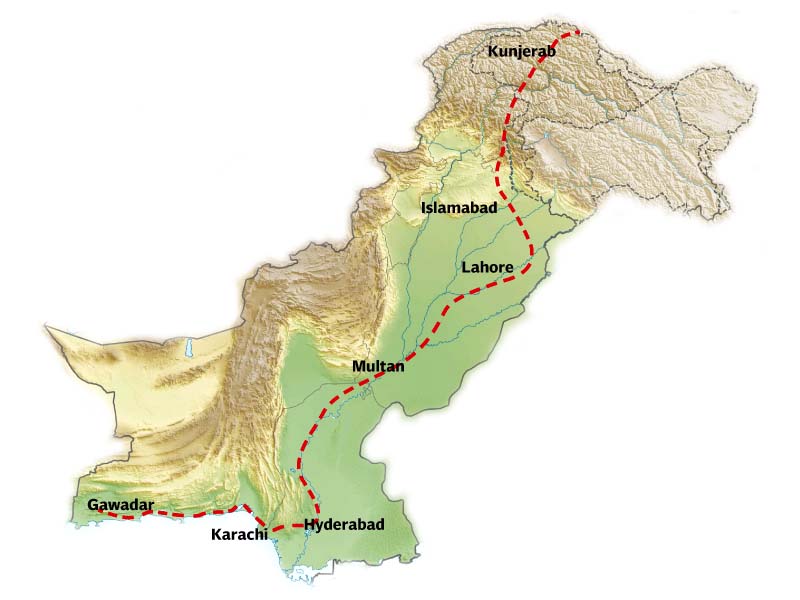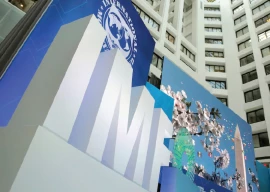
Pakistan and China will sign multibillion-dollar infrastructure financing agreements during the long-awaited visit of Chinese President Xi Jinping to make the eastern corridor route operational, which may put controversy over alignment of the China-Pakistan Economic Corridor to rest.
Both countries will sign a government-to-government infrastructure framework agreement to initiate work on four projects besides separately signing their financing agreements.
The four projects will have to be completed to make the existing alignment along eastern parts of the country operational as a ‘stopgap arrangement’, said authorities in the Ministry of Planning and Development.
These projects are along the eastern corridor linking Thakot in the north to the Gwadar Port.
The officials said there were many missing links in the existing alignment that have to be bridged by the end of next year to make the Gwadar Port operational under the China-Pakistan Economic Corridor (CPEC).
Under the programme, China wants to develop its under-developed western parts and will also have access to strategically located deep-sea Gwadar Port to secure commercial sea lines.
During the Chinese president’s visit, which is expected to begin from Monday, the financing agreements will be signed by Finance Minister Ishaq Dar and China’s commerce and trade minister. Dar will cut short his Washington visit and reach Islamabad on April 19.
The Chinese president’s visit will also play a critical role in restoring the regional power balance that foreign policy experts say has tilted in favour of India after President Barack Obama’s trip to New Delhi.
In the short term, both the countries have agreed to make the eastern route operational, which is easy to build besides being the safest among the three alignments. All of them are planned to be made operational in the next 15 years. They said there will be multiple nodes on the corridor, which will connect all the provinces.
Eastern line
The alignment has now been agreed with the starting point at Kashgar China and Khunjerab Pakistan. It will pass through Thakot-Mansehra-Islamabad-Lahore and Multan.
From Multan, the route will be linked to Hyderabad through Rohri and Dadu. The Hyderabad-Karachi portion will be linked through M-9. Karachi then will be linked to Gwadar through N-10 East Bay Express Way along the coastal line.
The framework agreement will ensure concessionary Chinese financing to make the eastern corridor fully operational.
Under the corridor, 487km Karakoram Highway Phase-II will be constructed from Raikot-Sazin-Thakot-Mansehra to Islamabad at a cost of $3.5 billion. During the visit, an agreement will be signed for roughly $1 billion concessionary financing for constructing 120 km of the 487km road.
The financing agreement will also cover the 387km Multan-Sukkur route to be constructed at a cost of $2.6 billion. China will give a 90% concessionary loan.
The East Bay Express Way costing $148 million will be part of the framework agreement, the officials added. Financing for the New Gwadar International Airport is also part of the broader agreement.
At Sukkur, the corridor is divided into two categories. The one along the eastern line will lead to Karachi and connect Gwadar through the coastal highway.
The second one will go through the centre of the country via Dera Allahyar to Khuzdar and touch the western route.
The western line passes through some restive areas of Balochistan. The officials said the western corridor was part of a long-term plan that was under process and will be completed by 2030.
There has been opposition to the eastern corridor by some political forces and the government is trying to overcome these challenges, said the officials.
“The opponents of the fate-changing project like CPEC are the enemies of Pakistan,” said Minister for Planning and Development Ahsan Iqbal.
He said the country has to learn from Chinese development experience and stop politicising mega development projects through political statements.
The officials said the CPEC will equally benefit all the provinces. In Khyber-Pakhtunkhwa, an 802km road and rail network will be constructed. In Balochistan, a 3,366km road and rail network will be constructed as well.
The $130-million breakwater construction at the Gwadar Port and $28 million for dredging of berthing areas and channels at the port are part of the package to be signed by both the sides.
China will also fund infrastructure development at the Gwadar export processing zone, necessary facilities for fresh water treatment at Gwadar and upgradation of the Gwadar Hospital.
Published in The Express Tribune, April 16th, 2015.
Like Business on Facebook, follow @TribuneBiz on Twitter to stay informed and join in the conversation.

1732071267-0/lana-(2)1732071267-0-165x106.webp)
1727242355-0/Diddy-(1)1727242355-0-165x106.webp)

1732063440-0/elon-(3)1732063440-0-165x106.webp)












COMMENTS (17)
Comments are moderated and generally will be posted if they are on-topic and not abusive.
For more information, please see our Comments FAQ